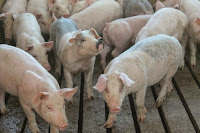Farm Factors Influencing Influenza A Virus Infection In Weaner Pigs

Reprinted as posted on Swine in Minnesota blog
A scientific article written by Dr. Fabian Chamba Pardo when he was doing his PhD in the Torremorell lab was recently published in the journal of Preventive Veterinary Medicine. The study presented aimed to look at the various factors influencing the influenza infection status of piglets at weaning.
Highlights
- Sow vaccination decreased influenza infections in piglets at weaning.
- Influenza positive gilts at entry were associated with positive piglets at weaning.
- More work is needed to assess herd closure, gilt isolation and gilt vaccination.
Eighty-three farms from two different pig production companies and located in Iowa, Minnesota and South Dakota were enrolled in this study. Samples were collected at weaning on a monthly bases for a little less than six years as part of routine surveillance programs. The majority of farms submitted four oral fluid samples per month, but some collected nasal swabs or oro-pharyngeal swabs.
Twenty-three percent of the samples tested positive for influenza allowing the collection of 173 hemagglutinin sequences. In the H1 hemagglutinin subtype, isolates were 93.8% to 99% similar between each other and 94.3% to 97.4% similar to the vaccine strains. The largest discrepancy was found in the delta 1 clade. In the H3 hemagglutinin subtype, isolates were 95.9 to 99.7% similar among each other and 997.3% to 97.5% similar to the vaccine strains.
The influenza status of the piglets at weaning was influenced by several factors.
Seasons and vaccination status of the sows against influenza influenced piglet infection status at weaning. Indeed, sow influenza vaccination was significantly associated with a decreased probability of piglets testing influenza positive at weaning. Both whole-herd and pre-farrow vaccination protocols were better compared to no vaccination and there were no differences between both protocols. Additionally, having influenza positive gilts at entry increased the probability of detecting positive piglets at weaning.
Among all the factors evaluated, sow influenza vaccination and gilt influenza status at entry were the only factors associated with influenza in piglets at weaning in Midwestern breed-to-wean farms.
Read the entire publication on the journal website.








